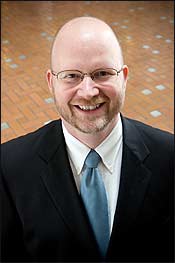
Boys Will Be Boys?
Duck athletes are not getting the message
By ANDREW SKINNERLOPATA
 |
Athletes are role models and heroes. Kids grow up wanting to be the quarterback, the running back or place-kicker who makes the game-winning play; the guard who makes the clutch three-pointer or the power forward who dunks over his opponent. The impact of sports culture can be measured not only in the multi-billion dollar sports market but also in the attitudes and norms that children and adults learn from their sports heroes.
In the past month, no fewer than six UO football players have been suspected of, or charged with, various crimes, including two key players charged with crimes of violence against women. The responses to these incidents by UO head football coach Chip Kelly and UO Athletic Director Mike Bellotti can be summarized as follows: If a player is a vital part of the team and is charged with a violent crime against a woman, there will be no “rush to judgment,” and he will face no disciplinary action. If a player is not as vital to the team and does so much as publicly criticize the coach, he will be summarily suspended or dismissed. Kelly admitted as much when explaining why he suspended Kiko Alonso for his DUII arrest but has not disciplined LaMichael James, who was charged with five violent crimes: “In every single case, I look at the case itself and make the best determination. It’s ‘What are we doing for the student-athlete,’ and ‘What am I doing to my team?’”
What message does this send? First, that the athletes and the team are all that matters — there is no mention of how this all affects the school or the community, let alone the victims. Second, that male violence against women is acceptable. Third, the bigger star you are, the more you can get away with. Finally, that the athletes really make the rules and that the coaches just try to do damage control. Essentially the message is: we have done everything we can (“sit-downs” and “life-skills classes”), but — you know — boys will be boys.
In my law practice, I often represent clients in abusive situations. I see the toll that domestic violence takes on women and their children. I want my children to grow up in a society where male violence against women is not legally, morally or socially acceptable. As producers of heroes and role models, the UO athletic leadership needs to do more to see that their players live the truth that violence against women is unacceptable.
Beyond the obvious step of eliminating the disciplinary double-standard (which others have already advocated), the athletic leadership needs to be more proactive. On Feb. 3, before many of the headline-making incidents, Jackson Katz, Ph.D., gave a presentation on the UO campus entitled “More Than A Few Good Men: Why Some Men Hurt Women and How All Men Can Help.” Katz discussed the program he co-founded, Mentors in Violence Prevention (MVP), which is the leading gender violence prevention initiative in professional and college athletics (see www.sportinsociety.org/mvp for more information). Although every UO coach was invited, not one attended.
Fortunately, it is not too late for the UO to show that it takes this issue seriously by making MVP training mandatory for every athlete. This program could be a large part of the solution to the off-field violent behavior of its football players. Many will dismiss this program as sensitivity training that will not work if the athletes resist it. I have two answers to that: First, the program works. Here is one testimonial about its effectiveness:
MVP staff have “hit a homerun” when it comes to delivering the message that violence against women is unacceptable. MVP presenters articulate their message in a way that many student-athletes have not heard, whether it be through reflexive thought or active participation, they have unequivocally gotten our student-athletes’ attention. At Michigan State University, we are confident that the MVP program has made a difference in the lives of our student-athletes. — Jim Pignataro, associate AD, MSU
Second, nothing else seems to be working. Should the athletic director and the football coach be judged and rewarded based solely on the football team’s on-field performance, or should they be accountable for the broader affects the team has on the community and society? UO alum, UO students, Ducks fans and the rest of our community should demand real leadership — leadership that makes it clear that violence against women is unacceptable.
Andrew SkinnerLopata is a UO law alum and practices family law in Eugene.